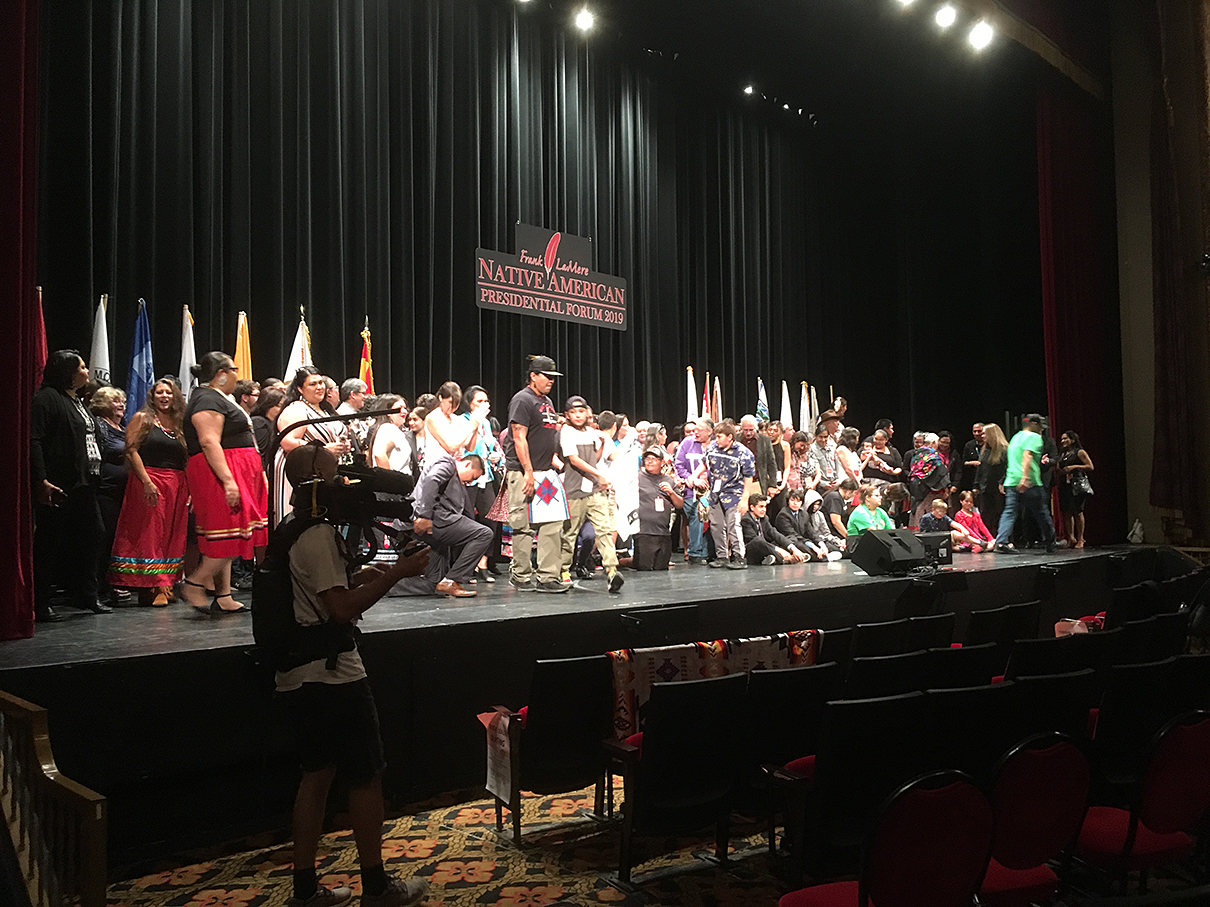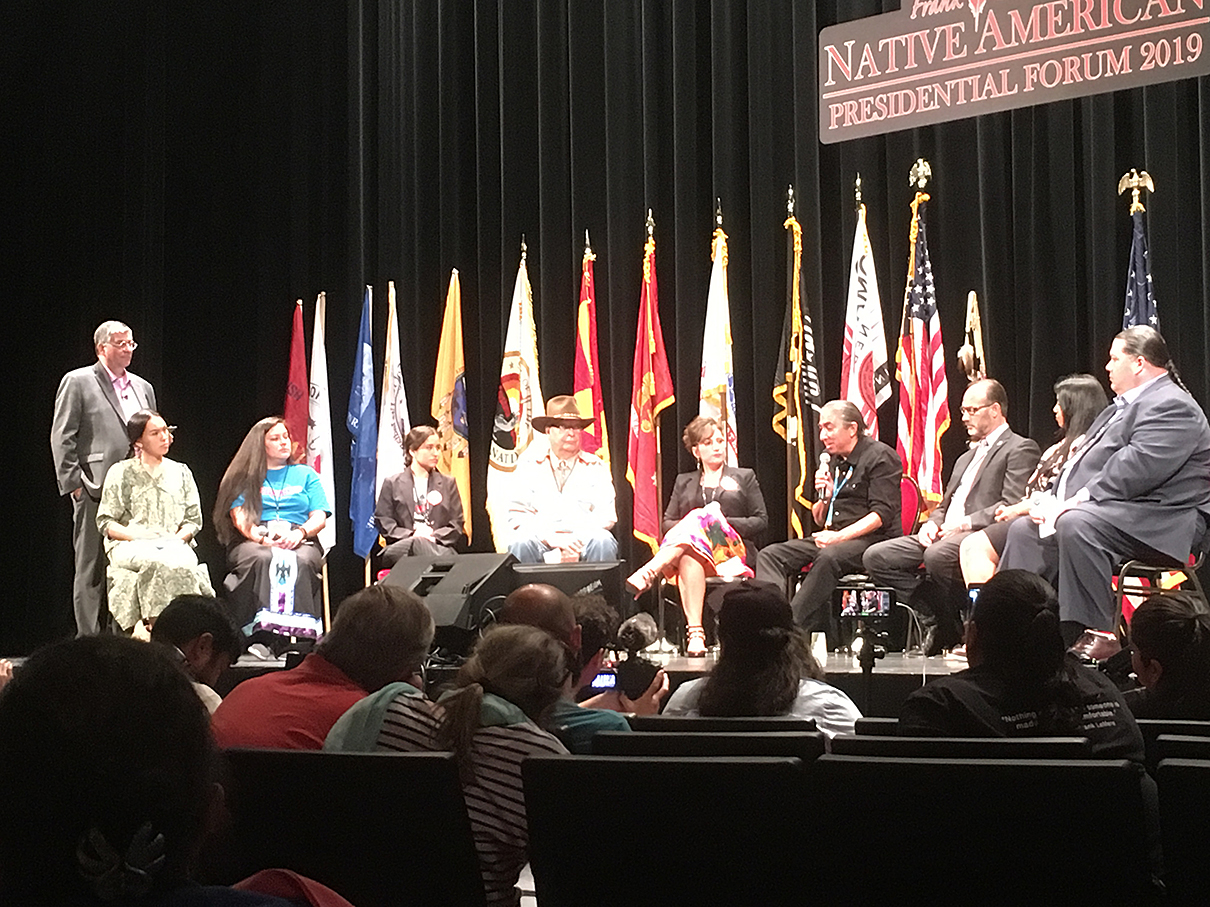Indian Voices Covers First Native American Presidential Forum
August 20-21 2019
by Aaron Long (Dine)
The Native American Presidential Forum in Sioux City, Iowa with the Santee Sioux, Winnebago, and other tribes. They don't call it the Great Plains for nothing. Eleven Presidential candidates stood in front of three hundred and fifty American Indians from all over the country: Florida, San Diego, New York, Oklahoma, and everywhere in between.
On assignment from Indian Voices, I arrived at the end of day one on a golden evening that gave the vast green fields glory and the old style buildings of downtown Sioux City a refreshing breeze of fresh modern air. I knew I've arrived when I seen the bright and shining ribbon shirts and skirts exiting the Sioux City Orpheum Theater. The buzz was Elizabeth Warren's apology and speech. It carried genuine weight that uplifted the audience to a standing ovation. It's as if it came from her very own heart. Those war cries and victory shouts made the lights flicker and the speakers crackle.
Four Directions Vote, a Native voting rights group from Mission, Iowa organized the two day forum. Why would a voting rights group put on such a forum? To get one million Native votes in the upcoming 2020 election #NativeVote2020. "When that happens, it'll change the political game forever," said Matt Samp, Communications Director.
The relationship between Natives and the United States, is a narrative that Americans need to confront. Native Presidential candidate Mark Charles, member of the Navajo Nation, has a campaign slogan that addresses the native issue on a fundamental level, "we need to abolish slavery!" The Doctrine of Discovery has no place within the constitution. The simple fact of including women in the constitution needs to be amended. In 2020, the abolishment of slavery is not a far fetched concern. I can think of so many Americans who confront the conscious and unconscious guilt that this country was built on and Mark Charles is making America confront it.
In the hotel, on the second floor where the crickets of Iowa found it so appropriate to hang out, I was able to catch up with Jean Schroedel, a Political Scientist of Claremont Graduate University in Los Angeles. She shared an experience as a white professor when one day a tribal leader, as a student, walked into her classroom and rocked her world upside down. He asked her to be an expert witness on a political subject she knew nothing about, Indian Country. She needed rez experience. The tribal leader told her to meet him at a reservation for a day long ride along. Her heart began to beat harder and her throat tighten as they passed crumbled buildings and cracked out streets. She began to see only a glimpse. A town surrounded by liquor stores and the people trapped in the middle.
Jean came into contact with an FBI agent who told her of a reservation where Indians were arrested based on license plates of that area. They were pulled over and charged with anything they could find. The FBI agent told her this because that's what they were ordered to do themselves. She made a trip to this reservation and as she pulled up, she saw cars parked along the reservation line. Less than 1/4 a mile down the road was a gas station and grocery store. What was in between? Women and children pulling wagons full of groceries, gas containers for their vehicles, and basic living supplies to an from their vehicles in fear of being arrested on non reservation line. Jean's heart sunk.
The native voting population has the ability to significantly affect the political system in the United States. Carol Bearshield of the Santee Sioux tribe, is one of many mothers who live in Sioux City. With her turquoise earrings and personal chair blanket, she said "a Native American Forum like this has never occurred here before." Her eyes bubbling behind her glasses. She is proud her family made the trip. She wishes to see more of her tribe filling the seats of the theater.
We sat there and spoke between candidates switching on an off stage. She worked with the honorable Frank LaMere over the years. The mothers of the Sioux Tribe, and neighboring tribes, marched for the children who have been taken, a MMIW issue that is highly prevalent in their area. Their efforts were responsible for passing the Indian Child Welfare Act in Iowa. "It's the children's prayers, in the court room, to be back with their families," Carol said, and that's why they stood with Frank LaMere, the late Native rights activist. Frank LaMere 1950 - 2019 is honored with this Presidential Forum in Sioux City.
Julian Castro, Presidential candidate from Texas and Secretary of Housing and Urban Development came into the theater with a snazzy suit and head held high. I was not present for day one of the forum, but I'm pretty sure he was the only one to thank the Water Protectors across Indian Country. Many of the candidates answered and reaffirmed the concerns of Indian Country, some better than others, and others much better and with conviction than others. Julian Castro delivered whole hearted answers to the panel of tribal leaders and elders. He was well versed and honored Frank LaMere from the start. He validated and acknowledged the Missing and Murdered Indigenous Women and Girls as an important issue that needs to stop. He supported the need to remove the Medal of Honor recipients of the Wounded Knee Massacre, which was absolutely not a battle, but a massacre, and therefore must be revoked!
Whether the issue is tribal consultation or socioecological issues before money, many problems need to be resolved. Not one candidate addressed the food crises that plagues much of America. While candidates, reporters, and leaders talked of over coming issues that affect Native Americans, soda, energy drinks, processed meats, and chips were served and inhaled like oxygen by staff and audience. What is going to be done about the colonization of food in this country? Supermarket hunting can only take us so far. If we're talking about native issues being solved in America, then gaining rights over our own food must be part of the conversation. Americans must put their own two hands and grasp a firm grip on their own natural local food production.
The Presidential election of 2020 will be a race for one million native votes #NativeVote2020. When that happens, native rights and issues will be heard like never before.



